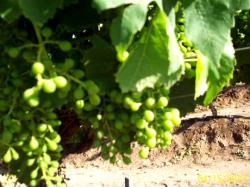Sonora Summit Focuses On Social Responsibility, Awards
April 20, 2010 | 2 min to read

From the signage in the vineyards to the message at the seminars, it was clear that Sonora grape growers want to communicate they are concerned about social responsibility.
“We realize everyone talks about it now”, noted Sonora Grape Growers Association (AALPUM) director Juan Laborin, “But we wanted to inspire our industry and guests to stay focused on this important issue”.
Colorful banners illustrating this large yet close-knit industry of 50+/- grower groups support social responsibility were carried along on the vineyard tours, attended by approximately 75 guests on Thursday, the 15th. In addition to an inspection of the grapes scheduled to hit the North American marketplace mid-May, the tour focused on showcasing the employee infrastructure at these ranches that includes fresh water systems, housing, schools, hospitals and playing fields.
At the reception and dinner that evening at Vinedos de la Costa near the Sea of Cortez, Mexico Supreme Quality (MSQ)/Mexico Supreme Quality (MCS), the official food safety certification body of Mexico’s Secretary of Agriculture (SAGARPA) also handed out awards for their 2010 Masters of MCS initiative.
The awards are given annually to those retailers, wholesalers and distributors who excel in procurement and promotion of produce from Mexico. This year’s winners included SuperValu (MN), Spartan Foods (MI), Charlie’s Produce (WA), MAS Melons and Grapes and SunFed (AZ distributors)
On Friday, there were presentations about successful social responsibility programs from an agency from Holland; new grape variety trends from an Israeli agronomist, and, for the closing, a motivational speech that focused on building worker morale by a noted Japanese/Mexican entrepreneur. Over 100 attendees were in evidence when the spring grape export crop projection of around 15 million boxes was announced.
John Pandol of Pandol Bros., Delano, CA, chairman of the U.S.-side Sonora Grape distributor group, noted on the international aspect of the event this year: “It’s evident that this is truly a global business now, and that we can learn from and adapt programs that have worked elsewhere.”
Source: Sonora Grape Growers Association
